Tyler Perry's I Can Do Bad All by Myself
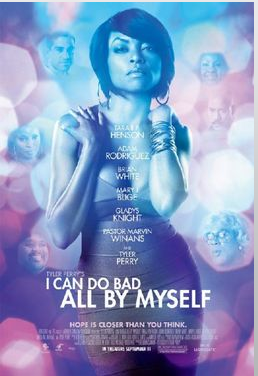
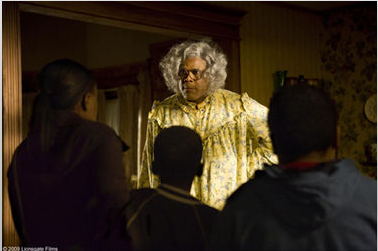 Make no mistake, though, I Can Do Bad All by Myself is a Tyler Perry movie. It's also easily the best one he's ever done. The characters are ever so slightly more relatable than they have been in the past, and while the drama is still very heavy-handed, it's handled in a somewhat more effective way than before. Before we can get to that, however, we have to get through the opening 20 minutes, which center on Perry's signature character, Madea. As everyone knows by now, Madea is a massive old granny played by Perry himself in a wig and a fat suit. She's built like a linebacker, slurs her words like a drunken sailor, and pretty much threatens physical assault to anyone who crosses her path. Perry's fanbase loves this character, but I for one find her about as appealing as watching Jessica Simpson perform Shakespeare. She grates on my nerves like few characters can, and the fact she's played by a guy in drag makes her come across like a bad Saturday Night Live character. Fortunately, Madea's only here to set up the plot. Some kids break into her house in the opening scene, and she sends them to live with their Aunt when they tell her they haven't seen their mother in four days. Once Madea drops the kids off, she pretty much exits the story altogether.
Make no mistake, though, I Can Do Bad All by Myself is a Tyler Perry movie. It's also easily the best one he's ever done. The characters are ever so slightly more relatable than they have been in the past, and while the drama is still very heavy-handed, it's handled in a somewhat more effective way than before. Before we can get to that, however, we have to get through the opening 20 minutes, which center on Perry's signature character, Madea. As everyone knows by now, Madea is a massive old granny played by Perry himself in a wig and a fat suit. She's built like a linebacker, slurs her words like a drunken sailor, and pretty much threatens physical assault to anyone who crosses her path. Perry's fanbase loves this character, but I for one find her about as appealing as watching Jessica Simpson perform Shakespeare. She grates on my nerves like few characters can, and the fact she's played by a guy in drag makes her come across like a bad Saturday Night Live character. Fortunately, Madea's only here to set up the plot. Some kids break into her house in the opening scene, and she sends them to live with their Aunt when they tell her they haven't seen their mother in four days. Once Madea drops the kids off, she pretty much exits the story altogether.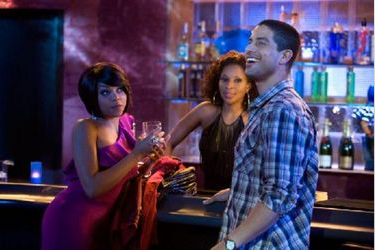 Their Aunt is April (Perry regular, Taraji P. Henson), a hard-drinking lounge singer who cares only about herself. Having to take care of the three kids creates a problem for her. She's currently dating and living with an abusive man (Brian J. White), who obviously cares little for her, and is even married to another woman. He hates kids, though he's not above attempting to sexually seduce and rape the eldest child, 16-year-old Jennifer (strong newcomer Hope Olaide Wilson). The character of the boyfriend is a typical misstep for Perry. He writes his villains so broad and completely evil, it must take a superhuman effort not to put devil horns on the heads of his antagonists. He sneers constantly, is verbally and physically abusive every chance he gets, and just so we know he's *really* evil, he's racist too. The scenes concerning this character rely on Perry's gift for hit you over the head melodrama. Whenever the villain is on screen, the movie loses all subtlety and honesty. Like Madea, however, he does not appear very often. It's almost like Perry himself is getting tired of his usual theatrics, and wants to try something different, but either his fanbase or the studio won't let him. So, he gives them just enough of what they want, but doesn't try to concentrate on them.
Their Aunt is April (Perry regular, Taraji P. Henson), a hard-drinking lounge singer who cares only about herself. Having to take care of the three kids creates a problem for her. She's currently dating and living with an abusive man (Brian J. White), who obviously cares little for her, and is even married to another woman. He hates kids, though he's not above attempting to sexually seduce and rape the eldest child, 16-year-old Jennifer (strong newcomer Hope Olaide Wilson). The character of the boyfriend is a typical misstep for Perry. He writes his villains so broad and completely evil, it must take a superhuman effort not to put devil horns on the heads of his antagonists. He sneers constantly, is verbally and physically abusive every chance he gets, and just so we know he's *really* evil, he's racist too. The scenes concerning this character rely on Perry's gift for hit you over the head melodrama. Whenever the villain is on screen, the movie loses all subtlety and honesty. Like Madea, however, he does not appear very often. It's almost like Perry himself is getting tired of his usual theatrics, and wants to try something different, but either his fanbase or the studio won't let him. So, he gives them just enough of what they want, but doesn't try to concentrate on them.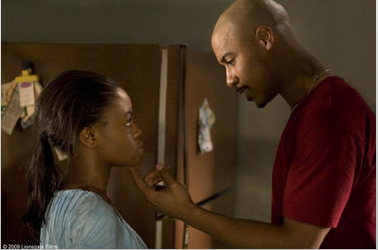 Instead, the movie is mainly focused on April, and her coming to grips of having to be a mother to the children, and how to care about something other than herself. If April seems a little more human than the usual Perry character, it's probably due to the performance of Henson (who was nominated for an Oscar recently for her role in Benjamin Button). She's appeared in a few of Perry's films, but this is her first lead role in one of them, and it was a smart move to build the movie around her performance. It's a surprisingly complex turn, covering all sides of the character. April is not exactly a sympathetic woman, but we can see signs of kindness that makes her transformation at the end at least a little bit more believable than it's been written in the screenplay. The man who begins to turn April around is a Sandino (Adam Rodriguez from TV's CSI: Miami), an immigrant who works as a handyman at the local church, and eventually starts fixing up April's broken down house. The scenes that April and Sandino share together have a kind of sweetness to them. That's because these scenes allow them to be actual characters, and not tools manipulated by the melodramatic plot.
Instead, the movie is mainly focused on April, and her coming to grips of having to be a mother to the children, and how to care about something other than herself. If April seems a little more human than the usual Perry character, it's probably due to the performance of Henson (who was nominated for an Oscar recently for her role in Benjamin Button). She's appeared in a few of Perry's films, but this is her first lead role in one of them, and it was a smart move to build the movie around her performance. It's a surprisingly complex turn, covering all sides of the character. April is not exactly a sympathetic woman, but we can see signs of kindness that makes her transformation at the end at least a little bit more believable than it's been written in the screenplay. The man who begins to turn April around is a Sandino (Adam Rodriguez from TV's CSI: Miami), an immigrant who works as a handyman at the local church, and eventually starts fixing up April's broken down house. The scenes that April and Sandino share together have a kind of sweetness to them. That's because these scenes allow them to be actual characters, and not tools manipulated by the melodramatic plot.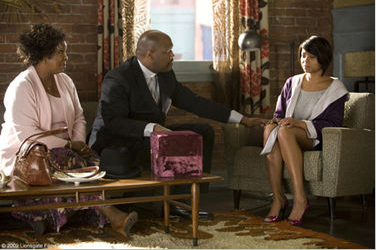 For everything that does work here, there's always something to bring us right back to reality. Perry's filmmaking style is still as flat as a pancake, and sometimes he doesn't even seem to know where to point the camera. You'd think with the clout he's built up in Hollywood by now, he could hire someone to give him a few pointers. The movie also suffers from a number of musical sequences that drag on a little too long, and stop the plot dead in its tracks. It's not that I don't understand why there are musical sequences. Why would Perry cast recording artists like Gladys Knight, Marvin Winans, and Mary J. Blige, if he wasn't going to give them the opportunity to sing in the film? It's just that nothing usually happens during these sequences, and we're stuck just watching them perform on a stage, with occasional cuts to the audience to show how moved they are by the song. Do we really need to see the audience's reaction when Gladys Knight is singing her heart out?
For everything that does work here, there's always something to bring us right back to reality. Perry's filmmaking style is still as flat as a pancake, and sometimes he doesn't even seem to know where to point the camera. You'd think with the clout he's built up in Hollywood by now, he could hire someone to give him a few pointers. The movie also suffers from a number of musical sequences that drag on a little too long, and stop the plot dead in its tracks. It's not that I don't understand why there are musical sequences. Why would Perry cast recording artists like Gladys Knight, Marvin Winans, and Mary J. Blige, if he wasn't going to give them the opportunity to sing in the film? It's just that nothing usually happens during these sequences, and we're stuck just watching them perform on a stage, with occasional cuts to the audience to show how moved they are by the song. Do we really need to see the audience's reaction when Gladys Knight is singing her heart out?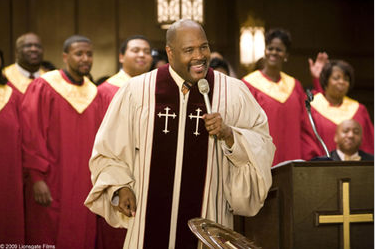
See the movie times in your area or buy the DVD at Amazon.com!






0 Comments:
Post a Comment
<< Home